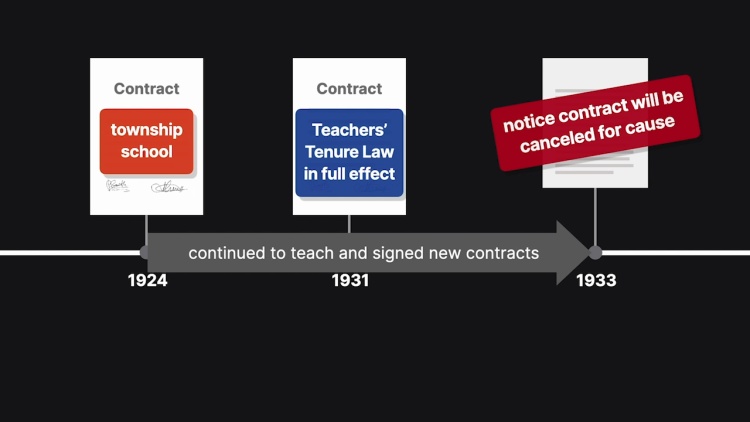Indiana ex rel. Anderson v. Brand
United States Supreme Court
303 U.S. 95 (1938)
- Written by Robert Schefter, JD
Facts
Dorothy Anderson (plaintiff) was a public-school teacher in Indiana. In 1924, Anderson signed a contract to teach in township schools. Her contracts were subsequently renewed, and she taught continuously in township schools through the 1933-1934 school year. Beginning in 1931, her contracts contained a clause directing that the Indiana Teachers’ Tenure Act of 1927 (the Act) was in full force and effect. The Act provided that teachers of five or more successive years, upon execution of another contract, became permanent teachers whose contracts continued indefinitely and could only be cancelled for just cause after a hearing. In 1933, the state amended the Act to omit township schools from its governance. Anderson filed a state court action against Harry Brand, an Indiana school official (defendant), seeking a mandate to compel the state to continue her employment. The complaint alleged that, after a just cause hearing, Brand notified Anderson that her contract would be cancelled after the 1933-1934 school year. That decision was affirmed by the county school superintendent. The court granted the state’s demurrer on two grounds: (1) the officials had authority to make the decision under the Act; and (2) the Act was repealed with respect to township teachers, and the repeal did not deprive Anderson of a vested right or impair her rights under the United States Constitution. The Indiana State Supreme Court affirmed on the second ground. The United States Supreme Court granted certiorari.
Rule of Law
Issue
Holding and Reasoning (Roberts, J.)
Dissent (Black, J.)
What to do next…
Here's why 904,000 law students have relied on our case briefs:
- Written by law professors and practitioners, not other law students. 47,100 briefs, keyed to 995 casebooks. Top-notch customer support.
- The right amount of information, includes the facts, issues, rule of law, holding and reasoning, and any concurrences and dissents.
- Access in your classes, works on your mobile and tablet. Massive library of related video lessons and high quality multiple-choice questions.
- Easy to use, uniform format for every case brief. Written in plain English, not in legalese. Our briefs summarize and simplify; they don’t just repeat the court’s language.






